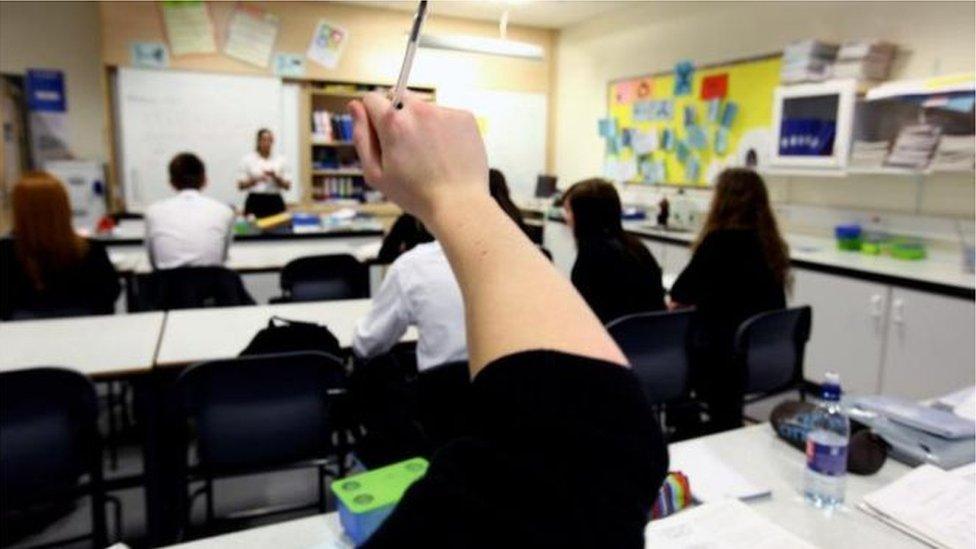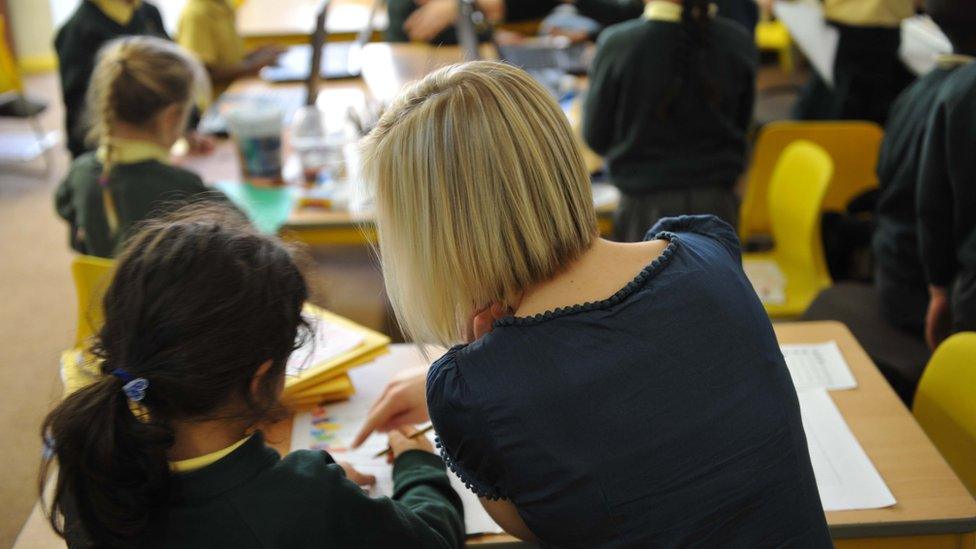Teacher numbers up in Scottish state schools
- Published

The number of English teachers fell, while the number of Maths teachers went up
The total number of teachers working in Scottish schools went up by 546 last year, according to Scottish government figures.
The headline number of teachers employed in state schools rose to 51,138 last year from 50,592 in 2017.
Nationally, the ratio of pupils to teachers stayed the same.
The number of English teachers working in secondary schools fell slightly in 2018 but the number of Maths teachers rose.
The total number of teachers in state schools has gone up every year since 2014.
Between 2017 and 2018, the number rose or was maintained in 22 council areas but fell in 10.
The biggest increase was in Glasgow while the biggest drop - of 2% - was in Dumfries and Galloway.
The headline number is the "full-time equivalent" number of teachers - not the total number of individual teachers as some work part-time.
An analysis of the figures gives details for individual subjects and identifies some long-term trends.
In 2009, there were 53,001 teachers in total. Headline teacher numbers reached a low in 2013 but have been stable or increased every year since.
'Short-term stability'
The current funding deal between the government and councils essentially means that teacher numbers can only be cut if pupil numbers are falling.
In 2018, there were 2,473 teachers who taught English as their main subject - down from 2,483 the previous year.
The number of Maths teachers, in contrast, rose slightly from 2,361 to 2,364.
While the short-term figures are stable, there are still significantly fewer English and Maths teachers than there were 10 years ago.

In 2009, there were 53,001 teachers in total.
The year before, there were 2,992 English teachers and 2,787 Maths teachers.
Meanwhile, campaigners are calling for more support for children with additional support needs.
Additional support needs is a broad phrase which takes in a number of different - and unconnected - problems and challenges.
It includes children with physical disabilities or who face lifelong challenges such as autism or dyslexia.
But it also includes those who may face short-term issues - for example, children who are being badly bullied or who may need some extra support after a bereavement or because their parents are going through a difficult divorce.
The presumption now is to try to provide the additional support within a mainstream school. Children normally only go to specialist facilities when this does not work out or seem appropriate.
'Not kept pace'
The Scottish Children's Services Coalition says it is concerned that the amount being spent on children with additional support needs (ASN) has not kept pace with the numbers who require support.
The number of pupils identified with ASN rose from 118,034 in 2012 to 199,065 in 2018 - with the total now representing 28.7% of pupils.
But over the same period the number of specialist teachers fell from 3,840 to 3,437.
Teachers' unions have also expressed concern about the level of support available for children with additional support needs.
The lack of support - and the difficulties this can cause teachers in specific cases - was cited by some as one of the reasons why teachers unions' wanted a big pay rise.
Last week, Scotland's largest teachers' union, the EIS, called off its planned strike ballot after an improved pay offer was made.
'Right support'
The Scottish government's new offer represents a compound increase of 13.51% over the course of three years.
A spokesman for the EIS union said that although teacher numbers had risen slightly, there had also been "a substantial increase in the number of pupils in our schools".
The union said this had resulted in "a standstill in pupil/teacher ratios".
"It is especially concerning that the number of children identified with Additional Support Needs (ASN) has increased while the number of specialist teachers has fallen," the spokesman added.
Deputy First Minister John Swinney said all children and young people "should get the support they need to reach their full potential".
He added: "While all teachers work with pupils with additional support needs, I welcome the overall increase in specialist staff which shows education authorities are continuing to invest in having the right support, in the right place, to meet young people's needs."